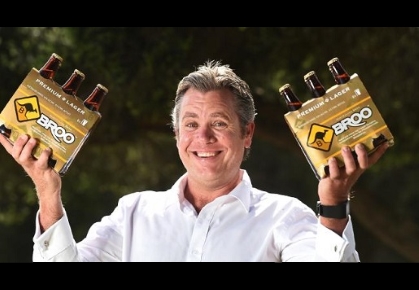
Founder steps down at Broo
Founder Kent Grogan has stepped down from his role at Broo effective immediately.
Grogan, who founded the business in 2009, will remain with the ASX-listed beer brand as general manager of the Broo Beer category. Fellow director Mathew Boyes has also stepped down.

Broo founder, CEO and chairman, Kent Grogan
Grogan’s employment contract has been amended to reflect this change, but the material terms of the agreement, including remuneration remain unchanged.
At the same time, Broo announced the appointments of Kobe Li and George Karafotias as directors of Broo, effective immediately.
Li spent eight years as a senior listings adviser at the ASX, with numerous management positions and currently serves as director of ASX-listed health company Wellnex Life and is a legal practitioner.
Karafotias is an accountant holding a Bachelor of Commerce degree from the University of Adelaide, and currently serves as the CEO of Wellnex Life.
“George and I are looking forward to joining the board of Broo,” Li said in a statement to the ASX today.
“We are also very pleased that Kent has agreed to stay on as an executive. Ken has deep relationships with Broo’s customers, distributors, suppliers and manufacturers, and will be well positioned to focus on maintaining and cultivating those relationships in his new role for the benefit of the company.”
Grogan commented that now was the appropriate time to step down and hand over leadership of the company.
“I am fully confident in the new revitalised board’s ability to lead the Company through its next phase of growth and build on the foundations that have been laid. I look forward to providing my continued support to Broo in my capacity as General manager and a major shareholder.”
The change in leadership was prompted earlier this year when two notices were received by the ASX, under Section 249D and Section 203D of the Corporations Act.
Those notices, filed by two shareholders of Broo, Knight61 Investments Pty Ltd and Filli Capital Pty Ltd, would force the removal of two directors of the company, Kent Grogan and Mathew Boyes, at a general meeting.
At the same time, Groges Holdings Pty Ltd, majority owned by Kent Grogan, moved to oust a director of the company, David Zhu, who joined the board in October 2021 from 61 Corporate Advisory.
The latest moves appear to be a culmination of these notices.
According to Dr Pamela Hanrahan, Professor of Commercial Law and Regulation at UNSW Business School, invoking Section 203D is relatively uncommon on the ASX.
“In a public company they can’t be there for life, and the Corporations Act says that shareholders of the company can call a meeting to remove directors at any time.
“It would suggest, without knowing anything more, that there’s been a disagreement at board level.
“It tends to be companies at the smaller end, smaller companies will have majority executive boards and they may have the founder on the board, and you need 5 per cent of shareholders to do it.
“At the big end of town you see professional investors and lots of investors, so it’s fairly uncommon, which is good because it does indicate that there’s a fall out at board level over the future and direction of the company.”
Grogan oversaw the company from the beginning, and spearheaded its IPO in 2016, when it had a market capitalisation of $126 million, and after four days had a capitalisation of $288 million. Its current market cap sits at $7.6 million.
In recent years the brand has struggled with revenues and profits, and recently was forced to alert the ASX of inaccuracies in its financial reporting, which misstated its losses and revenues for its annual report to 31st June 2021.
Despite a major contract brewing deal with Carlton & United Breweries in 2020 and touting a distribution deal with Australian Liquor Marketers, Broo has consistently underperformed during quarterly and annual reports.
In its most recent financial reports for the six months to 31st December 2021, revenues from ordinary activities grew 8.5 per cent to $566,363, but losses from ordinary activities after tax increased 183 per cent to $3 million.



